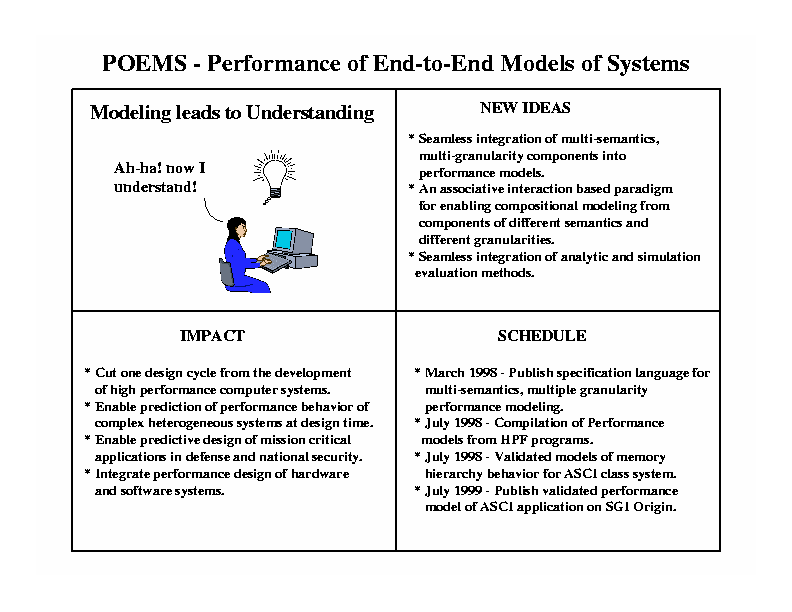
Principal Investigator
-
James Browne
Department of Computer Science
University of Texas
Austin, Texas 78712
Phone: 512-471-9579, FAX: 512-471-8885
browne@cs.utexas.edu
Co-Principal Investigators
-
Vikram Adve
Rice University, CRPC - MS 41
6100 South Main Street
Houston, TX 77005-1892
Phone: 713-285-5934, Fax: 713-285-5136
adve@rice.edu
-
Rajive Bagodia
Computer Science
University of California at Los Angeles
Los Angeles, California 90095
Phone: 310-825-0956, Fax: 310-825-2273
rajive@cs.ucla.edu
-
Elias Houstis
Computer Science
Purdue University
West Layfayette, Indiana 47907
Phone: 765-494-6181, Fax: 765-494-0739
enh@cs.purdue.edu
-
John Rice
Computer Science
Purdue University
W. Lafayette, IN 47907
Phone: 765-494-6007, Fax: 765-494-0739
rice@cs.purdue.edu
-
Olaf Lubeck
Scientific Computing Group
Los Alamos National Laboratory
Los Alamos, New Mexico 87454
Phone: 505-667-6017, Fax: 505-667-1126
oml@lanl.gov
-
Patricia Teller
Computer Science
University of Texas at El Paso
El Paso, Texas 79968-0518
Phone: 915-747-5939, Fax: 915-747-5030
pteller@cs.utep.edu
-
Mary Vernon
Computer Science Department
1210 W. Dayton Street
Madison, WI 53706-1685
Phone: 608-262-7893, Fax: 608-262-9777
vernon@cs.wisc.edu
OBJECTIVE
The goals of this project are:
- to develop a
comprehensive environment (POEMS) for end-to-end
performance analysis of large, heterogeneous adaptive
parallel/distributed computer and communication
systems, and
- to demonstrate the use of the
environment in analyzing and improving the performance
of defense-critical scalable systems.
APPROACH
The project will combine innovations from a number of
domains (communication, data mediation, parallel
programming, performance modeling, software
engineering, and CAD/CAE) to realize the goals.
First, we will develop a specification language based on
a general model of parallel computation with
specializations to workload, hardware and software. To
enable use of programs as workload specifications,
compilation environments such as dHPF will
be adapted to generate executable models of parallel
computation at specified levels of abstraction.
Second, we will experimentally and incrementally
develop and validate scalable models. This will involve
using multi-scale models, multi-paradigm models, and
parallel model execution in complementary ways. Multi-
scale models will allow different components of
a system to be modeled at varying levels of detail via the
use of adaptive module interfaces, supported by the
specification language. Multi-paradigm models will
allow an analyst to use the modeling paradigm --
analytical, simulation, or the software or hardware
system itself -- that is most appropriate with respect
to the goals of the performance study. Integration of an
associative model of communication with data mediation
methods to provide adaptive component interfaces will
allow us to compose disparate models in a common
modeling framework. To handle computationally
expensive simulations of critical subsystems in a
complex system, we will incorporate parallel simulation
technology based on the Maisie language.
Third, we will provide a library of models, at multiple
levels of granularity, for modeling scalable systems like
those envisaged under the DOE ASCI program, and for
modeling complex adaptive systems like those envisaged
under the GloMo and Quorum programs.
Finally, we will provide a knowledge base of performance
data that can be used to predict the performance
properties of standard algorithms as a function of
architectural characteristics.
CURRENT PLAN
This project has several threads of activity which will
be merged at regular intervals. Fundamental to the
project is the development of a language for
specification of multi-scale, multi-paradigm
performance models. The first version of the
specification language will be published in FY 1998.
A significant segment of the component library models
will be developed and validated in FY 1998. In particular
the first versions of models for memory hierarchies, for
parallel I/O and for high performance networks will be
developed and validated in FY 1998.
The first end-to-end models of relatively simple
applications on homogeneous parallel computers will be
developed and validated in FY 1998.
The initial version of the knowledge base on the
performance of commonly used algorithms on existing
parallel architectures will be established in FY 1998.
The initial implementation of the model development
environment utilizing the component models and the
knowledge base and compiling the specification language
will become available for use in FY 1998.
Return to: POEMS
homepage

